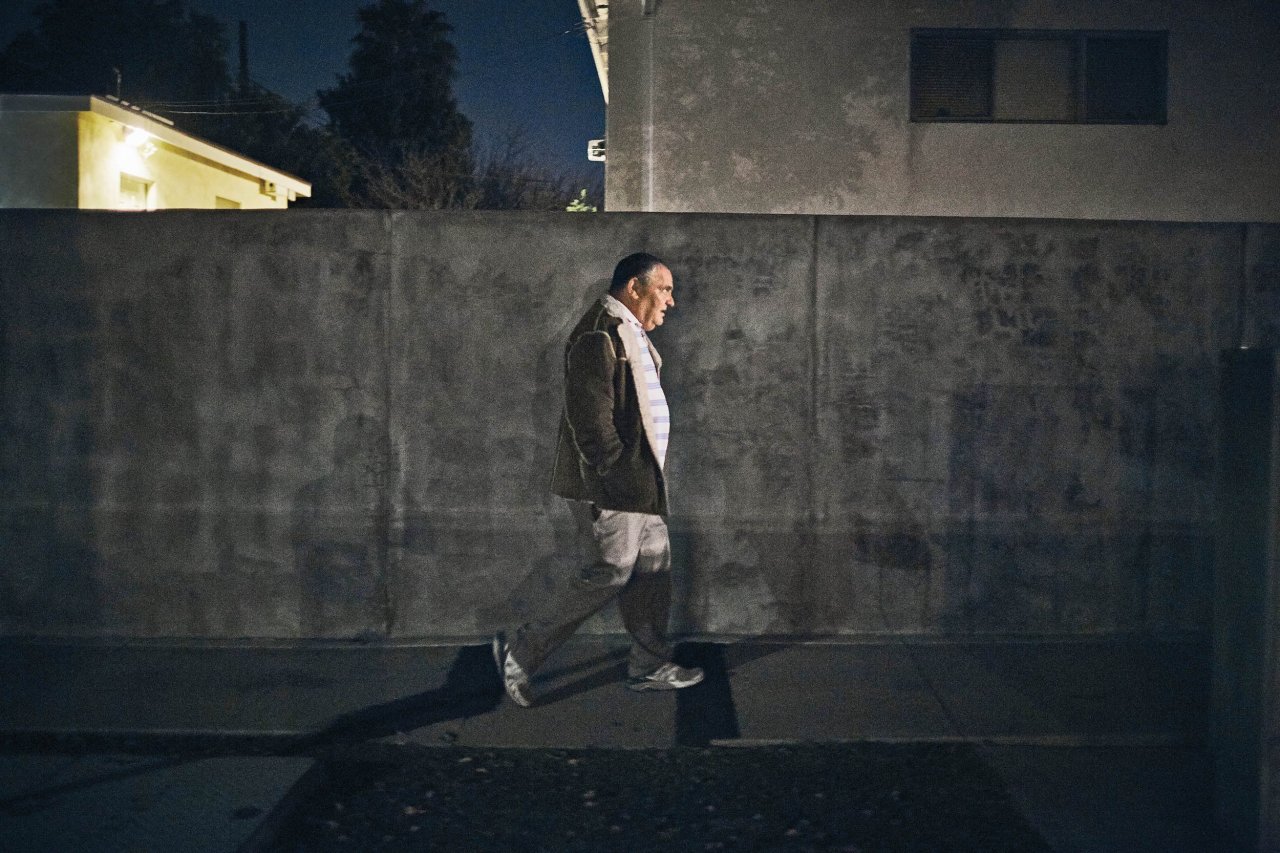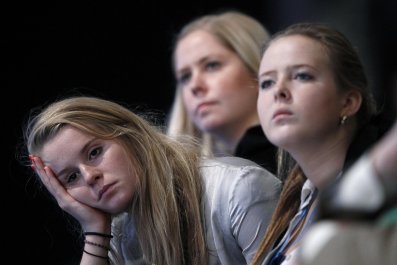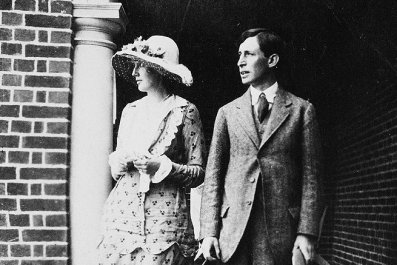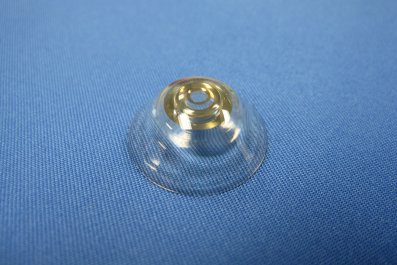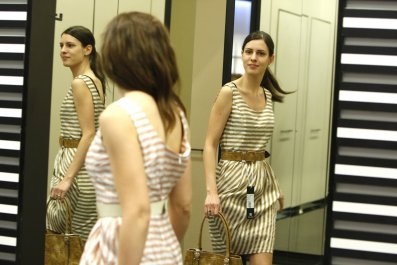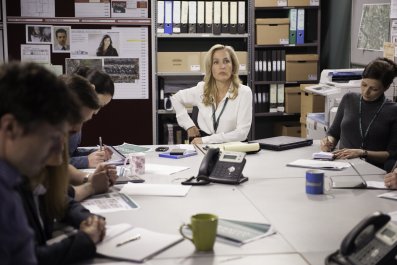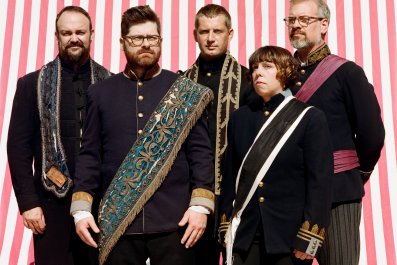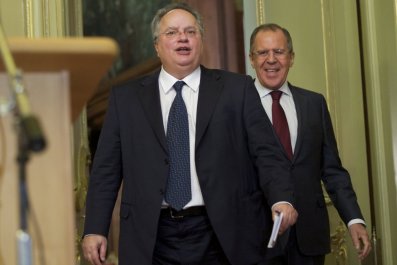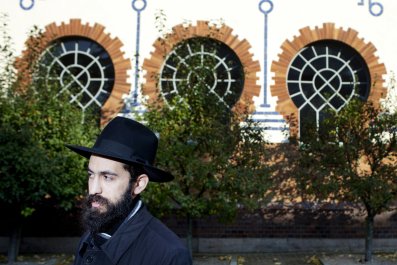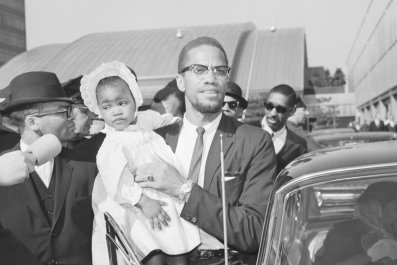Jonathan Mitchell arrives at Boardwalk 11, a Culver City, California, karaoke bar, well ahead of the Saturday night crowd, takes his usual barstool in the back and nurses his usual glass of cranberry juice. A woman in heels and black Lycra leggings is singing Garth Brooks, "Friends in Low Places." I'm not big on social graces, think I'll slip on down to the oasis. Behind the bar table, Mitchell's hands flap and flail about so softly most would not even notice his self-soothing fidgeting.
At 59, Mitchell easily admits that he is lonely. He walks with heavy shoulders, and a facial expression that is part grin, part grimace. His social life revolves around weekly dinners with his parents, both in their 80s. He can't keep a job. He can't find a girlfriend. He paces, obsesses, repeats himself and sometimes doesn't realize when he's saying something rude. Mitchell blames it all on his autism. "I hate it," he says. "It's a horrible disability. I wish there were a cure."
He has reiterated those three sentences on the Internet many times, in many ways, and his unapologetic, blunt stance has made him one of the most controversial voices in the autism blogosphere—he's one of the few who have shown outspoken support for the effort to find a cure. "Hopefully on my tombstone they will write, 'We don't need no stinkin' neurodiversity,'" Mitchell writes, taking a direct shot at the growing movement for acceptance and inclusion for people with everything from Asperger's to attention deficit disorder, epilepsy and Tourette's syndrome.
The neurodiversity movement began in the 1990s, gaining ground through social media, largely around discussions of autism. Proponents liken their stance to the struggle for acceptance of ethnic minorities, and for equality in gender and sexual orientation. There was a time, they point out, when the medical community considered homosexuality to be a mental disorder. What if people on the autism spectrum were accepted for their differences, rather than pathologized?
"As an adult with autism, I find the idea of natural variation to be more appealing than the alternative—the suggestion that I am innately bad, or broken and in need of repair," writes best-selling author John Elder Robison, who has Asperger's.
When it comes to the question of whether and how to "treat" autism, many neurodiversity advocates try to make a fine distinction: Remedies that aim to relieve suffering are OK, but the idea of a "cure" is repellent. Many believe, as autistic educator and author Nick Walker puts it, that the effect of a cure would be "the reduction of naturally evolved human diversity."
But Walker is a self-sufficient teacher, husband and parent. What of those severely autistic children who cannot speak or communicate at all? Shouldn't their parents be encouraged to seek treatments that might one day help them interact more easily with the rest of us? "Parents who whine and say, 'I would give anything for my kids to have a normal life,' these parents….have been taught this message of tragedy and hopelessness and have bought into it," Walker says. "It's awful. It's wrong. If a parent is putting effort into trying to cure autism, that effort is not helping that child thrive."
Philip Gluyas, another autism blogger, writes that Mitchell is bitter "because he was brought up that way by his mother after she was blamed for his autism when he was first diagnosed back in the 1950s. She tried to cure him, instead of [helping] him to adjust like a good mother would have."
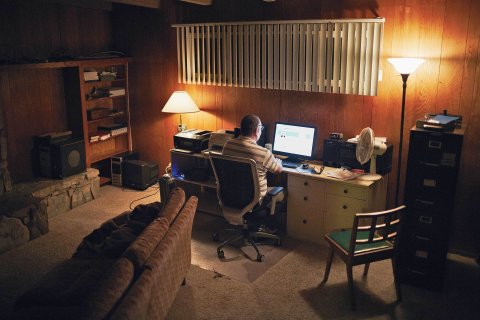
A Recipe for Misery
After some neurodiversity advocates learned I was writing a profile of Mitchell, I received a stream of emails and requests urging me not to. "The man is a threat to the stability of the autistic community," wrote Gluyas. "He is a hater. He hates himself."
"His life is bad, and he blames being autistic rather than blaming a world that is not set up for autistic people," says Walker. "It is no different than a black person blaming his race rather than society for his problems.… It has never made a gay person happy to hate himself for being gay. It's a recipe for misery."
Mitchell steadfastly demurs. He feels his experience isn't at all like the kind of oppression that comes with being gay or black. Prejudice against such minorities, he says, does not usually limit their abilities to find love or friends. His deficits, he explains, are social. He's tried to make friends and interact in person more (for example, he's joined support groups for people with depression, and another for people on the autism spectrum), but the crippling loneliness always returns. That, he says, is why he champions neuroscientific exploration and research that might one day lead to treatments.
Mitchell knows he is lucky. If not for his mom, a retired lawyer, and dad, a retired engineer, he believes he might be homeless. They give him $26,000 a year and also bought him a condo years ago. Later, he sold the condo to buy his current home: a spacious West Los Angeles house, where dozens of pencils with shoelaces tied to the ends fill his desk drawers and clutter his tables. Though he spends much of his days rocking back and forth, twiddling the pencils and shoelaces around and around, he can also drive, play poker and shop for groceries. He can cook one or two simple meals, and goes out to dinner regularly—by himself. At Italy's Little Kitchen, where he gets a table for one every Friday, the staff knows his order as soon as he walks in: spaghetti and meatballs.
Mitchell is also a prolific writer. He has penned three novels, 25 short stories and several hundred blog posts.
There are some on the autism spectrum who might be thrilled if they one day woke up with Mitchell's abilities. And there are some parents of children with severe autism—those unable to communicate or survive without constant supervision—who would do anything for a drug or treatment that would help those children grow up to be self-sufficient and fulfilled.
Death Threats
One day, as Mitchell and I sat in a Starbucks near his home, I pointed to regions of my head as he rattled off the brain parts that lay beneath, along with their functions. My hand moved to the midbrain. "That's the parietal lobes, which have to do with sensation and spatial relations and perception," he says, adding, "I may have a problem with parietal lobes. I have an inability to do blocks and puzzles. I have bad fine-motor coordination problems, and can hardly write in cursive." He spoke about five notches louder than most people conversing at nearby tables, causing some to look over.
In his quest for an autism cure, Mitchell has become a self-educated observer of neuroscience, highly adept at explaining the brain. He has met with Eric Courchesne, a neurobiology and autism expert at the University of California, San Diego, about seven times since 1989. Mitchell contacted Courchesne after reading about his research on how autism can be traced back to infancy. Mitchell is also Facebook friends with neurologist Marco Iacoboni, who runs the Ahmanson-Lovelace Brain Mapping Center at UCLA, where he studies mirror neurons, cells in our brains that help us feel empathy and play a role central to socializing and communication. Studies have shown that those on the autism spectrum may have deficits within their mirror neuron systems. Mitchell recently visited Iacoboni's lab and has been emailing back and forth with him with questions about mirror neurons since 2010.
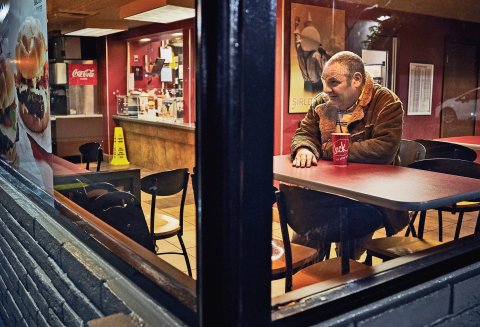
Mitchell has also built a relationship with Manuel Casanova, a professor of anatomical sciences and neurobiology at the University of Louisville. Casanova's research has centered on abnormalities within the brain's minicolumns—layers of the brain containing 80 to 100 neurons, which affect people's recognition and judgment—in autistic people. He introduced transcranial magnetic stimulation (TMS) as a practice to treat symptoms of autism. Though overall results have been mixed, TMS is increasingly being used at medical centers across the U.S.
When Casanova publishes new research, Mitchell is often the first to read his work, and he usually offers a more thorough critique than many of his neurology colleagues do, Casanova told me. In return, Casanova critiqued Mitchell's novel, The Mu Rhythm Bluff, about a 49-year-old autistic man who undergoes TMS—which involves sending electrical currents into underlying brain tissue—in an attempt to tone down his autism. "I was particularly impressed with the current scientific knowledge of the author and how mu rhythms, mirror neurons, and transcranial magnetic stimulation (TMS) make their way into the story," Casanova wrote in his Amazon review.
Casanova says members of the neurodiversity movement "claim what I do is practically genocide." They are concerned, he says, that "what I'm trying to do is change the way they actually think." When Casanova writes frankly on his blog about his views on treating autism, he is bombarded with angry phone calls and hateful emails. He has even received death threats.
Autism's Gone With the Wind
When her son was born in 1955, Norma Mitchell, now 86, just thought he was impossible to soothe. She was told that he had colic. As a toddler, he would smear feces on the wall, throw tantrums and fling himself around. But there were glimmers of hope. Mitchell was fascinated by a little record player in his parents' dining room, and he would watch the vinyl platter spin around and around. "I would be so delighted, thinking, Oh, my child is going to love music." Sometimes he would line blocks end to end across the floor, and she would think, He will be an engineer!
He learned to talk, but by age 2½ his words stopped coming. His parents took him to a psychoanalyst, who saw him four or five times a week starting when he was 3. "She blamed everything on me," Norma says. If she was a better mom, her son would improve.
At one point, his parents considered sending him away to an institution. "He said, 'Please don't send me away,'" according to Norma. They couldn't bring themselves to do it. They instead tried to encourage his hobbies, taking him to Japan when he was 10 after noticing he was interested in judo, for example. In the Tokyo airport, Mitchell got separated from them. Hours later, his parents found him at the terminal where their plane was supposed to take off. He'd figured out how to get there on his own without being able to speak or read Japanese.
"I always thought he would one day be normal," Norma says. "He seemed so close to it. Even today, when people meet him, he seems normal. And he is so far from normal."
When he was 12, the family found a new psychiatrist, and this one finally diagnosed him with autism. He went to a series of mainstream and special education schools, where at times he was threatened with expulsion for his behavioral problems, and bullied. "Usually, I was aware that other kids were bullying me, except occasionally when some girls in junior high…pretended to flirt with me and for a while," Mitchell writes. "I did not understand they were making fun of me."
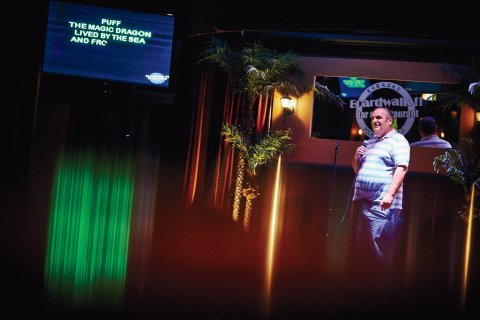
He still gets bullied, he says—but now it's by members of the neurodiversity movement. When not blaming his mother for his behavior, some have written mean-spirited songs about him. "They've called me turdball and buttwipe. One girl said I was like a Jew that sympathized with Nazis and I would gladly jump into [a] crematorium." Others have called him a quisling, or traitor.
Mitchell barks back. "You are homeless," he wrote to one critic. "You don't even have a loo to crap in…. The only girls you had sex with walked on four legs and are in a dog pound."
Jack says his son "tends to go overboard, he becomes very emotional about neurodiversity and a few other things." But immature behavior aside, he can't blame Jonathan for wanting a cure. "The loneliness is the worst thing. It's absolutely horrible. Just think of yourself with no friends, no relations." Mitchell often talks about all of the studies he's read, how some have found that autistic people might be more prone to chronic disease, and how a lack of friends can be as unhealthy as smoking cigarettes and drinking alcohol.
He does have one friend. Oliver Canby, a 22-year-old with shaggy blond hair and Asperger's, came across Mitchell's short stories and blog online after Googling "autism blogs" when he was in high school. "I thought it was interesting that he was autistic and supported the idea of a cure," Canby says. "I didn't know that [there were] autistic people [who] did support a cure. I thought all of them were members of neurodiversity."
Today, the two take regular walks together, talking about baseball, therapy, neurodiversity, autism, writing and women. Canby might be Mitchell's biggest fan. In an Amazon review of Mitchell's novel, he wrote, "This is perhaps the best novel ever written, the next Gone With the Wind."
This is the kind of admiration the neurodiversity advocates fear—that Mitchell's blog will find its way to more young people on the autism spectrum, fueling them with negativity about their brains and false hopes for a cure, rather than teaching them to love themselves as they are.
Almost in Rhythm
At Boardwalk 11, the night has been filled with upbeat songs by Nicki Minaj and Beyoncé. The deejay pulls Mitchell's name and song choice. "This one is a pretty sad song," he says. Mitchell takes the microphone as the music begins, belting out the lyrics to "Puff the Magic Dragon":
A dragon lives forever, but not so little boys
Painted wings and giant rings make way for other toys
One gray night it happened, Jackie Paper came no more
And Puff that mighty dragon, he ceased his fearless roar
Mitchell knows he will leave this karaoke bar early, and alone. He will wake up tomorrow and read the autism blogs.
"Autism is not your biggest problem. By far," writes Kimberly Wombles, mother of three autistic children, in a blog comment directed at Mitchell. On her blog, she states that her kids "do not need to be cured. I celebrate who they are. As a good parent does, I help them with skills they need to develop, but I love them regardless of their ability to make eye contact, to sit still, to go with the flow, to write, to become independent."
Autism, she says in her note to Mitchell, "isn't responsible for everything wrong with your life. It's not. Attitude and disposition go a long way to causing your problems, and that ain't autism."
Onstage, Mitchell shifts from foot to foot, almost in rhythm to the song, in his moment as the center of attention. The audience members mostly ignore him, turning to their drinks and friends, waiting for the performance to end.
His head was bent in sorrow, green scales fell like rain
Puff no longer went to play along the cherry lane
Without his lifelong friend, Puff could not be brave
So Puff that mighty dragon sadly slipped into his cave...



